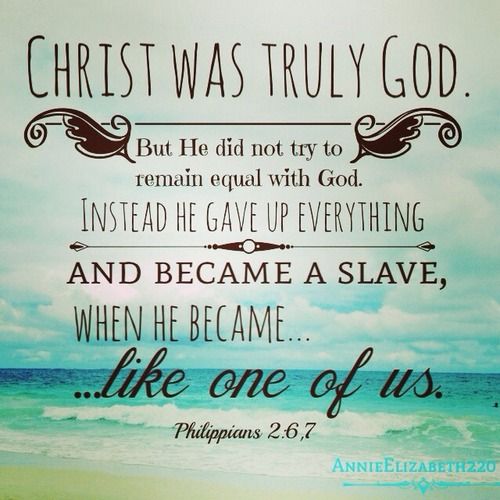Scripture Reading(s)
Philippians 2:5-11
2:5 Let the same mind be in you that was in Christ Jesus,
2:6 who, though he was in the form of God, did not regard equality with God as something to be exploited,
2:7 but emptied himself, taking the form of a slave, being born in human likeness. And being found in human form,
2:8 he humbled himself and became obedient to the point of death– even death on a cross.
2:9 Therefore God also highly exalted him and gave him the name that is above every name,
2:10 so that at the name of Jesus every knee should bend, in heaven and on earth and under the earth,
2:11 and every tongue should confess that Jesus Christ is Lord, to the glory of God the Father.
Reflections
 I think that this passage provides for us a picture of what true humility really looks like. Christ is our ultimate example of humility. However, humility did not make Him any less powerful or great. The main goal of Christ’s humble act was to give us humans a chance to learn and imitate Him.
I think that this passage provides for us a picture of what true humility really looks like. Christ is our ultimate example of humility. However, humility did not make Him any less powerful or great. The main goal of Christ’s humble act was to give us humans a chance to learn and imitate Him.
C.S. Lewis described humility in short yet profound words,
“True humility is not thinking less of yourself; it is thinking of yourself less.”
I believe that this passage highlights Christ’s definition of humility in two important ways.
1. Christ’s humility exemplified via sacrifice
Verse 7 talks about how Christ had to empty himself. This does not mean that He renounced His deity, however He did have to set aside His privileges in serval areas. A few of those areas include Him sacrificing His heavenly glory, earthly riches, and being with the Father without the physical separation of this world. Christ also sacrificed his physical body on the cross and endured the full payment for mankind’s sin.
2. Christ’s example of humility through difficult obedience
Verse 8 talks about how God had required of Christ to go to the cross. The cross did not just include being beaten and then killed. Jesus went to the lowest form of His humiliation in dying as a criminal. The death on the cross was not a death that was experienced by any ordinary means. Only the most filthiest and violent criminals were hung on the cross for the world to see. As one commentator puts it, Christ experienced “the cruelest, most excruciating, most degrading form of death ever devised. The Jews themselves, hated this manner of execution”.
He became a human so that we know what it means to act, think, and live in a way that gives God Glory. I encourage you try to have a humble heart as Jesus did.
God opposes the proud, but gives grace to the humble. (James 4:6)
 Paul instructs the Philippians by asking them, “Let the same mind be in you that was in Christ Jesus.” He then goes on to describe the what Christ’s version of humble meant; sacrifice and obedience, even unto the point of death. All this Paul was asking to the Philippians while he was in prison, himself. Paul was not speaking from a viewpoint of inexperience. Both Paul and Jesus (and the disciples) went to their death out of such humility. So, why would Paul command the Philippian church to do likewise, knowing they also will be persecuted?
Paul instructs the Philippians by asking them, “Let the same mind be in you that was in Christ Jesus.” He then goes on to describe the what Christ’s version of humble meant; sacrifice and obedience, even unto the point of death. All this Paul was asking to the Philippians while he was in prison, himself. Paul was not speaking from a viewpoint of inexperience. Both Paul and Jesus (and the disciples) went to their death out of such humility. So, why would Paul command the Philippian church to do likewise, knowing they also will be persecuted?
It is this self-sacrificing humility that continues to make the gospel so powerful. Even in the early church when Christians were continually being martyred Tertullian wrote that,
“the blood of the martyrs is the seed of the Church.”
To a Roman provincial governor he wrote,
“Your cruelty is our glory. Only see you to it, that in having such things as these to endure, we do not feel ourselves constrained to rush forth to the combat, if only to prove that we have no dread of them, but on the contrary, even invite their infliction.”
Even today in Asia and other countries where Christian’s are persecuted, scored of people are saved when they witness such bravery and humility in the face of trials and even death.
We are afflicted in every way, but not crushed; perplexed, but not driven to despair; persecuted, but not forsaken; struck down, but not destroyed; always carrying in the body the death of Jesus, so that the life of Jesus may also be manifested in our bodies. For we who live are always being given over to death for Jesus’ sake, so that the life of Jesus also may be manifested in our mortal flesh. (2 Corinthians 4:8-12)
And what becomes of these martyrs? They are seated in the presence of God, having ran the race and receiving the prize.
